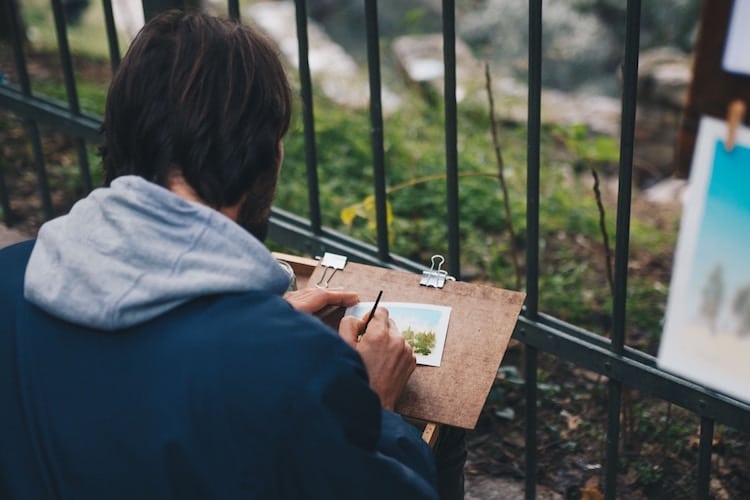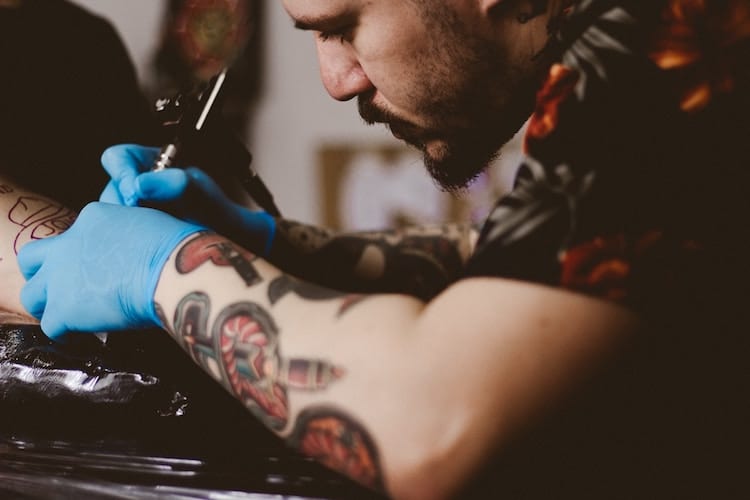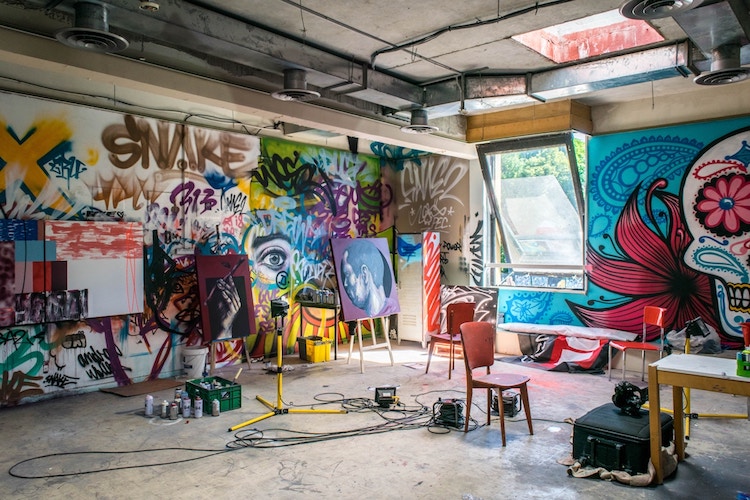
Photo: Luke Porter
If you’ve ever dreamed of turning your creative side hustle into a full-time career or if you are a college student majoring in the arts, you’ve undoubtedly been thinking about what it would be like to make a living from your art. From the outside, it can seem glamorous, jetting off to client photo shoots or being fêted at a gallery opening. But the reality is, creative careers are as hard—if not more difficult—than any other profession.
Competition is stiff and it takes more than raw talent to forge a path in the creative world. Above all, people looking to venture into full-time work as an artist of any sort need to ask themselves some hard questions before diving in. The more prepared you are up front, the higher the chance of success later on down the line. And with such a wide variety of professions in the art world, a close look at your goals and skills, mixed with a healthy dose of reality, will ensure you start down the proper path.
In some ways, these questions aren’t so different than those any young professional or person looking to change career would want to consider. But, when viewed from an artistic perspective, they will help you narrow your field and focus you on whether you are suited to your dream career in the creative world.

Photo: Markus Spiske
Here are 10 questions you need to ask yourself when looking to turn your creative passion into a career.
1. What am I looking for out of a career?
This seemingly basic question can be one of the most difficult to answer. But it all comes down to personal satisfaction, as everyone is driven by different things. For some, the monetary rewards of a career are the most important. For others, it’s making an impact on society. Or, it may be something as simple as wanting to be your own boss. Either way, this question requires a deep internal reflection on what will ideally make you happy long term.
2. Where do I want to be in my career in the next five years and what must I do to achieve my goals?
No business opens its doors without having a business plan, and you shouldn’t think of your own career differently. By knowing where you are going and what you want to achieve, you’ll be able to define the steps you need to take in order to meet those goals. This will keep you from drifting without any sense of direction. Don’t be afraid to think big and then work backward to set yourself up for success. Once you know where you want to go and what you need to do to get there, it will start to be clear an artistic career is realistically something you are cut out for. And remember, in five years, it doesn’t matter if you haven’t gotten that solo show at the Gagosian Gallery you had hoped for more than that goal helped push your career forward.
3. Who can I look to for mentorship?
Whether you are changing careers or just starting out, it’s always helpful to have a confidant and mentor who can guide you. You may even want to have more than one mentor that acts as a sounding board for your creative ideas or gives great business advice. It could be a former colleague, professor, or an acquaintance who has experience in the field, but also don’t be afraid to reach out to people who are more established. You’d be surprised how artists many are happy to help and give advice to new creatives.

Photo: SwapnIl Dwivedi
4. What type of work environment do I thrive in?
Are you a loner or do you thrive in group settings? Will you be disciplined enough to work from home and set strict studio hours or would it be better to set yourself up in an office or co-working situation? Being realistic with yourself about whether you are ready to handle the responsibilities that come along with freelancing is critical. One of the biggest mistakes new freelancers make is discovering they actually work better in an office environment, or vice versa. If this is the case for you, there are plenty of artistic opportunities within an office or group setting. Interior designers, animators, graphic designers, concept artists, and set designers are just some creative professions that work in group settings. Either way, figuring out whether you want to go it alone or work in a team is critical not only for your success but also your happiness.
5. What salary am I aiming for?
Or rather, how important is your salary? Think long and hard both about your expenses, as well as what type of potential salary growth you would be most comfortable with. Understanding whether or not you are willing—and able—to make certain sacrifices early for a larger payoff down the line is critical. PayScale.com is a great website to research the salaries of different professions by location, allowing you to understand what your bottom line might be as you embark on your new career. You’ll then need to think long and hard about whether or not the earning potential meets your expectations and if not, how you might want to adjust or realign your thinking. For some that might mean making material sacrifices, for other it could mean adjusting career paths altogether.
6. How realistic are my expectations?
It’s great to have lofty goals. In fact, thinking big and having confidence in your craft are wonderful qualities as you embark on your career. If you don’t believe in your art, how will anyone else? But, there’s also something to be said for being realistic with yourself. Are you expecting a six-figure salary in year one? Or gallery representation right out of art school? Both things may be possible depending on your skills and particular life situation, but it’s essential to take a hard look at your expectations and the timeline you are on. This doesn’t mean that you should set the bar low, but you should ask yourself, “What skill/opportunity/achievement do I possess that backs up this expectation?” The answer to that question will tell you all you need to know. And if your expectations are too high, don’t necessarily throw them out the window. Evaluate your timeline and see if you can build up through smaller goals in order to achieve what you’re after over time.

Photo: Priscilla Du Preez
7. How do I stack up against my competition?
Another question for the realists out there, it’s important to take an objective, critical look at who else is in your field. While you don’t want to focus too much on what everyone else is doing, you want to be aware of whether or not the work you are presenting stacks up. If your work is too far off from the rest of the competition, you may want to go back and evaluate whether or not you need more time to develop your skills or if you need to temper your immediate expectations.
8. Does my portfolio reflect my goals?
As an artist, your portfolio is an essential representation of who you are. How can the right galleries, clients, and collectors find you if you aren’t marketing yourself properly? For instance, if your goal is to become a portrait photographer, but your portfolio is full of landscapes, you can see how this would send a mixed message. This may mean going back to do creative work that reflects the vision you have of yourself as an artist or taking on small jobs that will help you build up a portfolio representative of the new direction your work is taking.
9. What am I willing to be flexible about?
Now that you’ve thought through your goals and expectations, what are your dealbreakers? Are you willing to take a pay cut for the creative opportunity of your dreams? Or work freelance to build up your portfolio in the hopes of later working with a world-renowned design house? In an ideal world, we’d have all boxes checked and everything in our career would line up perfectly, but that’s not always the case. Understanding what you are willing to compromise on—and for how long—in order to meet your end goals will only benefit you.

Photo: Allef Vinicius
10. How far am I willing to push myself to achieve my goals?
Working as a professional artist in any capacity takes determination and dedication. Putting yourself out there with your creativity can often be a personal, and emotional, effort, one that many cannot handle in the long run. But those who work long and hard to sharpen their craft, along with their business skills, can open the doors to a fruitful, satisfying career. Are you willing to forgo family vacations or an upgraded wardrobe to invest in your art supplies? Will you push yourself outside of your comfort zone to learn social media marketing and sharpen your communication skills? Getting real with yourself about how far you are willing to push in order to reach your goals will save disappointment down the line. It’s essential the whatever goals you have align with the steps you are willing to take in order to achieve them. And if they don’t match up, adjust accordingly.

Photo: Matthieu Comoy
Now get out there, and take the art world by storm!
Related Articles:
5 Ways for Creative Freelancers to Successfully Market Their Skills
Creative Career Advice: Knowing Your Market and Setting Prices
13 Ways for Artists to Sell Their Creative Work Online
How to Write an Artist Statement and Effectively Introduce Your Work to the World
